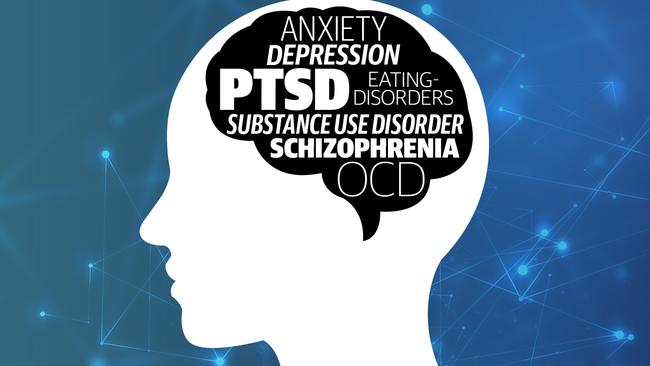The most common types of mental health illnesses
There are many misconceptions around mental health, but the main one is the belief that depression is the most common mental illness. It’s not — but do you know which one is?
Mental health illnesses can take form in many ways.
According to Black Dog Institute, one in five Australians aged between 16 to 85 will experience a mental illness in any one year.
The most common mental illnesses are depression, anxiety and substance use disorder.
These three types of mental illnesses often occur in combination of one another.
A person with an anxiety disorder could also develop depression, or a person with depression might misuse alcohol or other drugs.
Of the 20 per cent of Australians with a mental illness in any one year, 11.5 per cent have one disorder and 8.5 per cent have two or more disorders.
Here are the most common types of mental health illnesses.

ANXIETY
Anxiety disorders are the most common mental disorders, affecting one in four Australians at some stage in their life.
They include social anxiety, obsessive-compulsive disorder and post-traumatic stress disorder.
Worry or stress can often be misperceived as anxiety, but there is a huge difference between the two.
Black Dog Institute clinical psychologist Laura Kampel said “some stress can be helpful” but usually these feelings are “normal reactions” people face everyday.
For a person experiencing anxiety, their anxious feelings cannot be brought under control easily.
“Anxiety is more than feeling stressed or worried. It can hang around for a long time and disrupt one’s daily activities,” Ms Kampel told the Herald Sun.
Some people feel anxious for no reason or continue to feel like this after an event has passed.

DEPRESSION
Depression is the third highest burden of all diseases in Australia, with one in seven experiencing it in their lifetime.
Some types of depression include melancholia, psychosis, bipolar or antenatal and post-natal depression.
It’s important to note that depression is more than just feeling sad or moody from time to time.
It involves having these constant feelings for weeks, months or years — and sometimes they occur for no apparent reason.
“There are many misconceptions of depression, but the main one is that it’s seen as a weakness,” Ms Kampel said.
“Depression does not discriminate and majority of the time, it’s biological,” she said.
A person with depression may lack energy, have difficulty sleeping or loose interest in hobbies altogether.
SUBSTANCE USE DISORDER
Substance use disorder occurs when a person’s abuse of alcohol or drugs leads to health problems.
For the diagnosis of a substance use disorder, most mental health professionals use the criteria in the Diagnostic and Statistical Manual of Mental Disorders, published by the American Psychiatric Association.
“The criteria for substance use disorders includes taking the substance in larger amounts or for longer than you’re meant to,” Ms Kampel said.
It also includes cravings and urges to use the substance, not managing everyday activities because of the substance use and needing more of the substance to get the desired effect.
The exact cause of substance use disorder is not known, but a person’s genes, emotional distress or peer pressure can be contributing factors.
EATING DISORDERS
According to Beyond Blue, eating disorders are an unhealthy preoccupation with eating, exercise and body shape.
Distorted thoughts about an individual’s body can lead to changes in one’s eating and exercise routine.
A person may begin to vomit, binge eat or fast in an unhealthy manner.
They may also go to great lengths to hide or disguise their behaviour as they may experience intense feelings of guilt or shame.
Ms Kampel said there are a variety of treatments that can help someone with an eating disorder.
This includes psychologists, psychiatrists, and dietitians.
Treatments are often long-term and intensive, depending on how severe the disorder is.
“If for example, someone has severe anorexia, the focus of treatment will be to make sure they are physically healthy and so it may be necessary to admit this person to a hospital,” Ms Kampel said.
“If someone is experiencing bulimia or binge eating disorder, cognitive behavioural therapy is the therapy of choice”.
POST-TRAUMATIC STRESS DISORDER
PTSD is a condition that can develop from a terrifying or traumatic event.
This may be from a sexual assault, home invasion or a car accident.
People with PTSD have lasting memories of the event.
It can often be quite frightening because these memories tend to cause people to become emotionally numb.
Effective treatments are available and most involve psychological treatment but medication can also be prescribed by a professional in some cases.
MORE NEWS
MENTAL HEALTH STATISTICS IN VICTORIA
EVERYTHING ABOUT THE MENTAL HEALTH CARE PLAN
TOP MENTAL HEALTH APPS YOU NEED RIGHT NOW
SCHIZOPHRENIA
Schizophrenia is an illness that is characterised by changes in the functioning of the human mind.
“It’s likely that some people are born with a predisposition to develop this kind of illness and that certain things like stressful life events or the use of drugs such as marijuana, LSD or speed, can trigger their first episode,” Ms Kampel said.
The main psychological triggers of schizophrenia are stressful life events.
This includes bereavement, the end of a relationship, physical, sexual or emotional abuse or losing your job.
Schizophrenia tends to occur between adolescence and the mid-twenties however it affects less than one per cent of the population.
